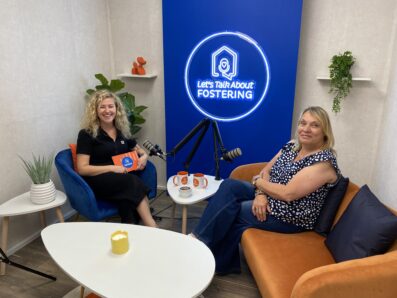Moving into a foster home is a big change for any child. When it also involves being apart from a sibling they are close to, it can feel even more difficult.
Let’s explore why siblings may be separated in foster care and how older children and teenagers can be affected, as well as ways to support them through the transition.

Sibling separation in foster care
Fostering aims to keep children together under the same roof wherever possible. However, the sad reality is that there are not enough foster parents in the UK who have the time, resources, or space in their home to care for multiple children at once.
Some foster parents also believe that they couldn’t manage caring for more than one child, but with the right support – like we offer here at FCA – many actually could.
As a result, many children have no choice but to live separately from their siblings, sometimes many miles from one another. Children report that being separated from their brothers and sisters is one of the most challenging aspects of their experience in foster care, and can lead to feelings of:
- Anger
- Worry
- Frustration
- Fear
- Anxiety
- Loss of control
These negative feelings can impact a child’s behaviour and how well they settle into their new foster home. But when siblings are able to stay together, the benefits are far-reaching. These include allowing them to continue their close relationship, preventing worry, providing comfort and familiarity and ensuring that they have a loved one by their side during a challenging time. That’s why fostering siblings is one of the most rewarding types of foster care.
How sibling separation impacts older children
Every child who enters foster care will have endured Adverse Childhood Experiences that led them to needing the support of a foster family. Children in care are often expected to adjust to huge changes that most adults would find extremely distressing, such as being separated from loved ones and moving into an unfamiliar environment, all while having very little control over their situation.
Older care-experienced children can be especially impacted by sibling separation. Often, when it’s decided that a sibling group will not be reunified with their birth family, the younger siblings will be adopted by new parents, while the older children are more likely to remain in the foster care system.
When matching children with families, it’s generally easier to find homes that can accommodate multiple young siblings. Older children and teenagers, however, are more likely to be fostered separately or offered supported accommodation rather than the more traditional family environment of a foster home.
Understanding parentification
Older children often deal with the additional challenge of Parentification. Parentification can occur when a child is forced to behave like an adult to ensure their needs and those of their family are met if their parents are unable to do so.
For example, if a siblings live in an unstable home where parenting is inconsistent, an older sibling may take on parental responsibilities. This could include getting their siblings ready for school, cooking meals, or even managing family finances.
It takes time and patience for parentified children to learn that it is safe to be a child again, and that they can trust their foster parent to take care of adult roles and responsibilities. While teens may seem very mature in some areas, they may need extra support in others due to the impact of parentification and Complex Developmental Trauma.
Learn why fostering teenagers is a fantastic opportunity to make a huge difference in a young person’s life.
The importance of family time for foster children
One of the biggest ways you can support a child who’s living separately from their siblings is by prioritising family time.
Most children in foster care will keep in touch with their birth family to some degree, and a foster parent’s relationship with birth family members is an important element of achieving reunification for families. In most cases, part of your role will include taking children to family time visits with their parents and siblings.
You can also support your foster child’s relationship with their siblings by providing opportunities for them to connect in other ways. For example, via video calls, sending letters, and playing video games together online.
These interactions can all support sibling relationships and help them feel like they’re part of each other’s lives, even when they’re unable to live in the same home.
Could you foster siblings?
By fostering siblings, you help keep brothers and sisters together. This means that despite the uncertainty of moving into care, they still have their siblings’ hands to hold and a chance to grow up by each other’s side.
And when you foster with FCA, we’ll help you do it. Our support for foster parents includes wrap-around support, high-quality training and a generous fostering allowance paid per child—find out how much you could receive by using our fostering allowances calculator.
Ready to start your fostering journey? To learn more about just how incredible fostering could be for your family, enquire with our team today.






